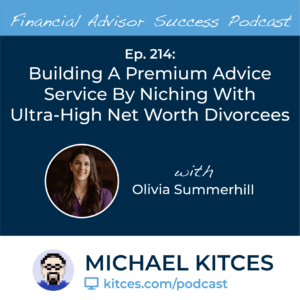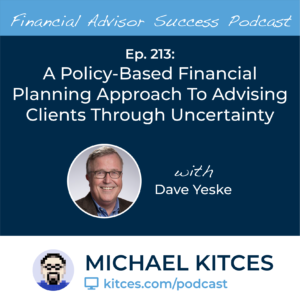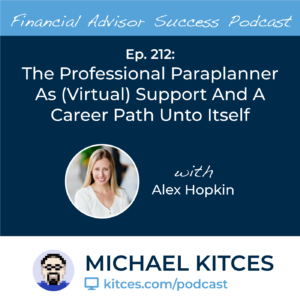 Welcome back to the 214th episode of the Financial Advisor Success Podcast!
Welcome back to the 214th episode of the Financial Advisor Success Podcast!
My guest on today's podcast is Olivia Summerhill. Olivia is the founder of Summerhill Wealth, an independent RIA based near Seattle that exclusively works with women who want help adjusting to and maintaining their standard of living after a divorce. What's unique about Olivia, though, is the way she's focused her practice on a particular segment of ultra-high-net-worth divorcees allowing her to set her fees at $20,000 for an engagement, and then commit to working with no more than five active clients at any particular time.
In this episode, we talk in-depth about how Olivia crafted a niche of working with divorcees, how she leverages the expertise of her CDFA designation to work with divorce mediators and collaborative divorce attorneys, the way Olivia developed her unique pricing model and found the confidence to charge $20,000 for her services, and the depth of hand-holding services she provides to her clients after they complete the divorce process. From helping them set up credit cards in their own name to helping them buy a house on their own for the very first time.
We also talk about how Olivia has been able to find and attract ultra-high-net-worth clients with upwards of $100 million in net worth. From the way Olivia has built networks of affiliated professionals who themselves are sought out by ultra-high-net-worth clients as a way to first connect with them. The philanthropic and other organizations that Olivia joins and gets involved with in order to meet the professionals that work with that type of clientele. And why it's so crucial to understand that professionals serving the most affluent clients aren't necessarily looking for reciprocal referrals, but instead are focused on their own role as gatekeepers for their clients who are trying to identify truly trustworthy professionals to work with.
And be certain to listen to the end, where Olivia shares her own path to taking the leap of entrepreneurialism that she never thought she'd take. The career coach who helped Olivia better identify her own natural talents and find her own confidence. Olivia's unique 'informational interviews' approach that she takes to everything from networking for new clients to finding the firms and professionals she wants to work with herself. And why Olivia decided that the best path forward was to keep her firm focused on this niche from its day-one launch.
So whether you’re interested in learning more about why Olivia decided to obtain her CDFA designation, how she builds her network of trusted professionals, or why she decided to provide a high-touch service at a premium fee for a limited number of clients, then we hope you enjoy this episode of the Financial Advisor Success podcast.

 Welcome back to the 213th episode of the Financial Advisor Success Podcast!
Welcome back to the 213th episode of the Financial Advisor Success Podcast! Welcome back to the 212th episode of the Financial Advisor Success Podcast!
Welcome back to the 212th episode of the Financial Advisor Success Podcast!
